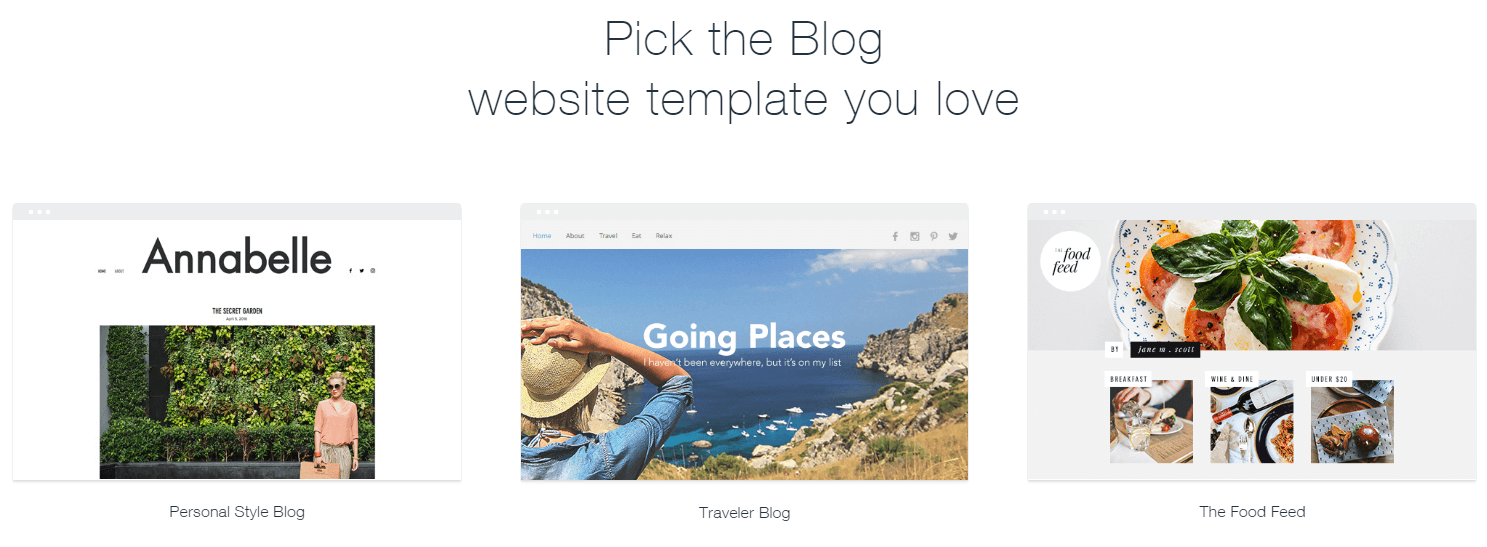Creating a website has never been a task for the faint of heart. Even the simplest site will require time, money, and know-how to steer it in the right direction. That’s where Wix vs WordPress come into play.
The main difference between Wix and WordPress is that Wix is a website builder while WordPress is a content management system. Both platforms allow you to build websites and they share one common goal: enabling users to create stunning and usable websites in a simple manner.
In the spirit of healthy competition, we’ll be pitting Wix vs WordPress to measure how they perform against each other in four different categories. In the end only one will remain, so let’s get the fight started!
Wix vs WordPress
1. Ease of use
Getting started with Wix is a simple process. Once you’ve signed up, it will ask you what kind of website you want to create. It will then send you right over to its collection of templates for your chosen category.

After making your choice you can begin tinkering with it using Wix’s colorful drag-and-drop editor. You can create new pages using a drop-down menu without leaving the editor. Switching between them comes down to only a matter of seconds.

There’s also the Wix ADI feature, which stands for artificial design intelligence. It’s a module that builds an instant website for you based on a few questions that you need to answer beforehand. This feature saves you the time and effort of designing the site yourself.
In the Wix Editor, you’ll also find an AI Text Creator, which asks you for quick input about your business and then generates unique text for your website so you don’t have to.
Moving onto WordPress, taking your first steps with the CMS used to be a little intimidating for people with no web development experience. But since the launch of the Block Editor (aka Gutenberg), building a website with WordPress became a lot more visual (and a lot easier).

There are thousands of articles and tutorials that cover every simple step of the process – from creating new pages to choosing the right theme. These resources do make it easier to learn, however, getting to know WordPress’ ins and outs can still take a while.
Still, once you dedicate some time to familiarize yourself with how the WordPress Block Editor works, starting and customizing a WordPress website should be a breeze. This even applies to people with no coding experience who might normally feel intimidated at the thought of building a site.
Taking all of the above into consideration, we tip our hats in favor of Wix for the first round of the Wix vs WordPress matchup. Despite how much easier it is to make a WordPress site nowadays compared to the pre-Gutenberg era, the bottom line is that if you’re an absolute newbie with zero web development experience, Wix is going to be even easier to get up and running.
2. Depth of Customization
For this round, we’ll take into consideration two aspects: design customization, and the ability to implement advanced features.
Wix offers its users hundreds of website templates – all of which are fully responsive. It also enables you to tinker with the editor to add your own personal touches, which is a good start.

When it comes to the implementation of advanced features, Wix boasts a catalog of over 300 apps that can be added to your site in a matter of seconds. They range from form builders, to reservation systems, and even pricing tables.

WordPress, on the other hand, only offers 17 official themes on its site. That’s pretty disheartening until you realize that there are thousands of third-party themes available on other sites, including our very own Themeisle.

There are also all kinds of WordPress themes built specifically for the Block Editor that let you customize your website in a visual, intuitive way. One example of a block theme that we developed ourselves is Raft.
Moving on, when it comes to plugins, WordPress is second to none. There are over 60,000 plugins available on WordPress.org, and the community shows no signs of slowing down. If you can imagine something, there’s almost certainly a plugin for it.
Moreover, the Gutenberg Block Editor gives you flexibility in customizing your website in many creative ways. Apart from its default functionality, you can add new features by installing various Gutenberg extensions, such as our own Otter Blocks plugin.
Round two of Wix vs WordPress goes to WordPress. It is simply the undisputed king when it comes to customization options.
3. Security
Wix and WordPress feature two entirely separate approaches when it comes to security. The first takes it entirely out of your hands and handles the security aspect of things on their own. The only exception being the basics such as choosing a good password and using two-factor authentication. Otherwise Wix takes care of everything else. Once you sign up for a plan and you continue to pay, there will be people whose job it is to keep your site safe.
In contrast, WordPress places the brunt of securing your website on your shoulders. You need to stay on top of core updates, check for various errors, choose the right host, and handle pretty much everything else yourself.
To some people, this may sound like a lot of responsibility, but it’s mostly common sense. A WordPress website is as secure as its owner makes it.
Furthermore, there are plenty of plugins dedicated solely to keeping your WordPress sites safe, such as WordFence.
WordPress takes the crown again this round. Although WordPress leaves site security up to the owner, securing your WordPress site is not that challenging. You shouldn’t face any security problems as long as you stay on top of the factors we mentioned. Furthermore, you have the option to make your site as secure as you want it to be.
4. Support
Wix offers both a robust knowledge base as well as telephone (you can request a callback) and support. The downside of Wix’s support is that they use cookie-cutter responses quite a lot. So you may have to write them a few times to get your issue resolved if it’s a bit more complex. Response times are usually less than 24 hours, which is acceptable.

On the other side of the coin, WordPress doesn’t offer any specialized support aside from its knowledge base. However, entire libraries could be filled with the many articles that have been written on how to perform any imaginable action using the CMS.
What’s more, most plugins and themes receive support from their developers. This can be compared to always having a chef available to answer your questions whenever you’re making a recipe.
This round of Wix vs WordPress is a tie. Finding help for your particular issues may require a bit of googling with WordPress, but you’ll be sure to find an answer to just about any inquiry if you look hard enough.
5. SEO
Wix hasn’t really got the best reputation for SEO. But rest assured, this comes mainly from Wix’s past when they were still a Flash-based website builder. In 2012 however, they switched to a completely new platform based on HTML5. When that switch happened, Wix added all modern SEO options like customizable URLs as well as page titles and descriptions. They even added 301 redirects and the possibility to add canonical URLs to your pages. You can check this table for a full SEO feature list.

An area they still need to work on is their loading speed. Despite having improved quite a bit already by adding advanced features such as page caching and better image compression, you are still limited to what the Wix editor allows you to do.
WordPress, on the other hand, lets you do whatever you want. Not right out of the gate but if you install the right plugin(s) your SEO options will be limitless. Yoast is a great one but there are also very decent alternatives available, including RankMath.
You also have much better options to crank up your loading speed by choosing your own host and adding plugins to cache and minify your pages.
The final round goes to WordPress again. Even though Wix’s SEO options are probably sufficient enough for beginners, having access to a full arsenal of tools is better. If you are in a very competitive niche then this applies even more so.
Wix vs WordPress: Which one should you use? 🧐
Ultimately, we have to rule in favor of WordPress when it comes to the Wix vs WordPress debate. WordPress enables its users to customize every single aspect of their website.
Despite forcing users to take security into their hands, it provides them with all of the tools to do so. Lastly, there are hundreds if not thousands of articles and tutorials available for tackling any issues you might encounter. In other words, even if you get stuck, there’s an article out there that will guide you to get unstuck.
💡 Pro tip: if WordPress is your choice, but you’d like to make the setup easier for yourself, then consider signing up for hosting with a company like Bluehost. Right after sign-up, you’ll get the option to have WordPress installed on your server with one click. This removes the early challenges with the technical side of things completely. Bluehost prices start at $2.75 / month.
Whichever decision you make will come with its own set of pros and cons.
Although we chose WordPress as the better overall option, it’s not to say that Wix isn’t a viable choice. We’ve already shown how easy it is to use and the great tools it offers. If you’re just looking to get an attractive website up and running quickly, then it might just be the right pick for you.
Do spend some time to think about it, but don’t spend so much time where you end up not making any decision at all. In the grand scheme of things, whether you build your website with Wix or WordPress is less important than the fact that you build your website at all.
Which side are you on when it comes to the Wix vs WordPress debate? Share your reasons with us in the comments section below!





Or start the conversation in our Facebook group for WordPress professionals. Find answers, share tips, and get help from other WordPress experts. Join now (it’s free)!